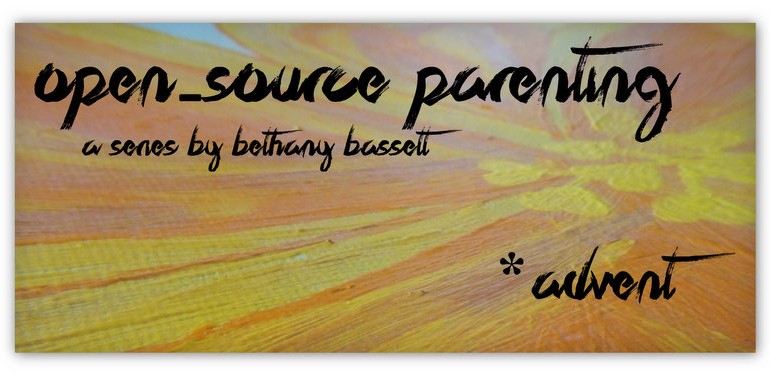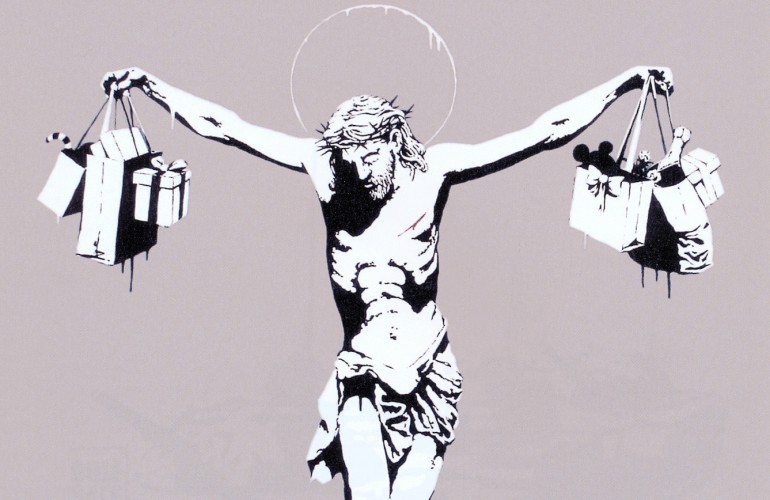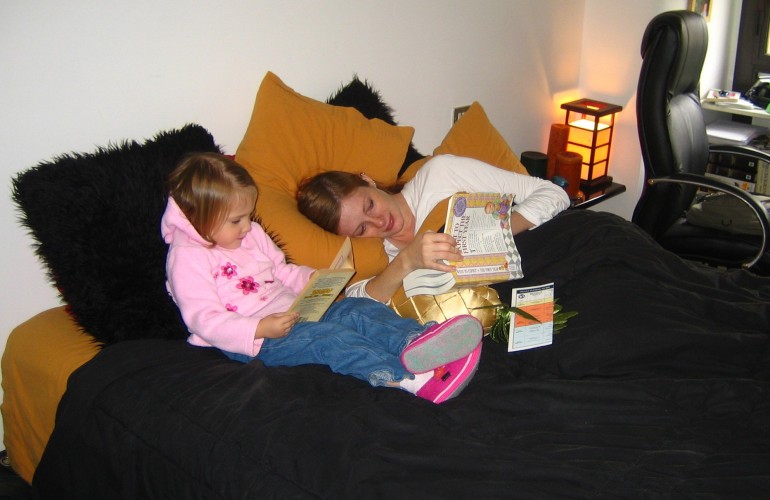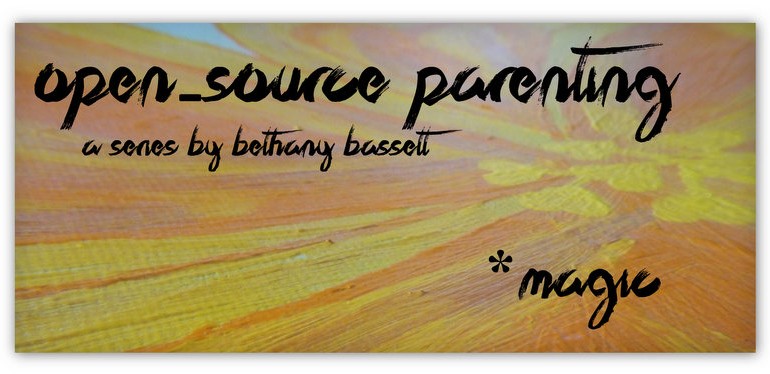Possibly the most significant search of my adult life has been for honest theology.
By that, I mean I’ve been seeking out ways of understanding God that don’t require me to shut down my curiosity, ignore my doubts, or twist pieces of the puzzle until they finally fit into the bigger picture. This isn’t to say that I’m against any sense of mystery in my spiritual journey. In fact, getting comfortable with not-knowing has helped me more than textbooks full of pat answers ever did. I just want to be sure that the experts who talk to me about God and the Bible and the difficult points of Christianity have wrestled their way through the kinds of questions that I do. I want my doctrine to come with rug burns.
I’m sharing today at A Deeper Story about one such question and the grammar lesson that helped me toward an answer. There’s no expert advice here, but I can guarantee you this—
It’s honest.
[Ed: Now that Deeper Story has closed its doors, the post is here in its entirety:]
~~~
My philosophy professor was a bright-eyed man with a Shakespearean sense of humor, but even that did not help me feel goodwill toward him the day our class discussion turned toward Jesus. It wasn’t that our views on Jesus were so very different. After all, we were at an evangelical Christian university with a strong Southern Baptist bent; folks there might disagree on whether the wine of Jesus’ first miracle wasn’t in fact Welch’s grape juice, but we all took as a given that Jesus was God incarnate and the basis of our faith.
It was the why behind my professor’s faith that made me feel as though a swarm of midges had invaded the classroom.
“We follow Jesus because he is The Truth,” my professor declared, all but dusting his hands with the certainty of his words. “Seeking truth is our greatest motivation in life, and God is true. That’s why Christianity has flourished throughout time. It’s why all of you are Christians today.”
I had to fight back an impulse to jump to my feet spluttering like a shaken can of Coke.
Instead, I raised my hand and explained—hopefully more calmly than I felt—that I disagreed. That not even God expects us to follow him out of a pure, Buddha-esque devotion to truth. That the Bible is full of incentives: healing, hope, blessing, joy, the divine trump card of salvation, even imperviousness to poison. That we follow God not out of some sense of philosophical duty but because he makes us an offer we can’t refuse.
My professor looked at me like I had just stepped off the madman set of King Lear, and I spent the rest of the class silent, fuming, and a little shocked by the intensity of whatever was fizzing around inside of me. So what if my professor approached spirituality as a quest for truth? Why should his view on the matter provoke such wild resistance in me?
The answer, as I was later able to articulate to myself in the privacy of my dorm room, was that I’d already experienced enough Truth to last me the rest of my life and then some. My childhood faith had been mapped out in the stark lines of right versus wrong. I’d learned to follow God because he demanded it of me, and how else do you react to a deity holding all the cards? You play along. You nod your head yes sir and no sir. You worship as instructed. You sing “I love you Lord” while trying to convince yourself that the emotion sweeping you isn’t actually the definition of holy terror.
College is where I finally began to extricate myself from the tyranny of Truth. Friends prayed with me weekly that I’d be able to absorb the idea that God loved me—really loved me, with the kind of crinkle-eyed affection that might just mean he liked me too—and I started to curate bits and pieces of a new perspective on Christianity that would welcome my heart and soul and experiences and emotions and curiosity in addition to my mind. I was only toe-deep into this process though when my philosophy professor declared that our ultimate goal is Truth and sent my fragile new setup spinning.
Why, REALLY? I wanted to ask him. My soul had been chafed threadbare by esoteric arguments; what I needed was for God’s goodness to be real, observable, woven through the fabric of everyday me. I needed someone to look me straight in the eyes and tell me what drew them back to Jesus when the costs began to mount. How was following God worth it?
/ / /
Just over a year ago, we moved from one side of our neighborhood to the other, a distance of about half a mile. My husband and I decided to move partly because it would reduce our rent by half (one small plus of the economic crisis) but also because we felt cut off from our purpose in the beautiful large house on the hill. The image that we felt ourselves projecting from that house was one of wealth, self-sufficiency, and pulled-togetherness, even if reality sang a different tune. To be honest, it was gratifying to be seen as people winning at life. However, we felt the hollowness of that as well, the vertical distance it was creating between others and us. Our pulled-together appearance was only an illusion, but it was an isolating one, and after four years there, Jesus’s words on social justice had stopped making sense to us.
So we moved. We found a fifth-floor apartment on the other side of the neighborhood that would meet our work-from-home needs, and we began to understand just how much of a difference half a mile can make. Where my writing desk used to look out over olive groves, it now faces a row of gray government-subsidized housing. Our girls play with neighborhood kids on the concrete patio beneath our building instead of in a private backyard. The cloak of respectability is worn thin here, and we see brokenness lived out on the public stage of our block every day—domestic disputes, child abuse, mental illness, shouts of “Whore!” and “Bitch!” reverberating through broad daylight.
We’re out of the bubble just as we’d hoped. We’re finally getting the chance to wrap our arms around neighbors in crisis and engage meaningfully with our community. The cost though… Oh friends, the cost. I’d anticipated the sacrifice of our time, our mental energy, and our convenience, but I hadn’t considered that we’d also have to let go of our expectations. I hadn’t realized that the happy ending clause I’d tacked onto my willingness to serve was going to be rendered obsolete almost immediately. I’ve had to face that, in all likelihood, the people I help aren’t going to reward me by getting better,and it’s shaken up old questions to splutter and fizz around inside me.
Why continue? Why carry out Jesus’s directives to feed the hungry and welcome the stranger and love the enemy when I don’t get to claim any [immediate or measurable] benefits? How is following God worth what it’s costing me? What gives, Jesus?
For better or worse, I’ve always needed to know what God offers in terms I can wrap my hopelessly practical mind around. “Fire insurance” isn’t a good enough reason for me; neither is the search for truth or the promise of heaven or any number of moral pats on the back. My impatient streak takes over and requires that I know exactly what Jesus is bringing into my here and now.
Which brings me to the major difference between my questions twelve years ago at college and my questions today: an answer.
A few years ago, I was reading through Raising Hell by Julie Ferwerda when a certain paragraph stopped me short. In it, the author points out that John 3:16 was originally written in the present progressive tense instead of the future one that most of us are familiar with. (Any of you allergic to grammar, just bear with me a second.)
“For thus God loves the world, so that He gives His only-begotten Son, that everyone who is believing in Him should not be perishing, but may be having life age-abiding.” (Concordant Literal Translation)
Ferwerda argues that the use of the present progressive—is believing, not be perishing, may be having life—is intentional and meant to convey that both salvation and soul-death are current processes. “Think of it like a green plant thriving by a water source, or withering away for lack of water,” she writes. Spiritual life or death now. Heaven or hell here. Salvation not as an insurance policy but as an active component of the life I lead every day. Kingdom, come.
The name Immanuel has been breaking me open and putting me back together lately because I really can sense God with me, setting the world right through touches of divine nonsense–my door opened to a neighbor who’s not going to change but who needs love anyway; a neighbor’s door opened to me even though my savior complex is showing; grace in the present progressive for us all. This grace is the why for me, the offer I can’t refuse. It’s what redeems the everyday moments and the cost of persistence. It’s the truest evidence of Immanuel to me, the truest expression of healing and hope and salvation-in-real-time, so true in fact that even I might be persuaded to call it The Truth.
image source (art by Banksy)













